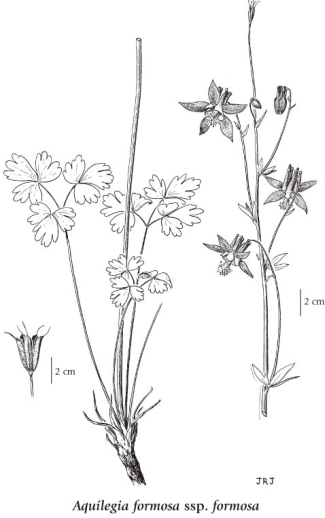Click on the image below to view an
expanded illustration for this species.

|
General:
Perennial herb from a taprooted, usually branched, woody stem-base; stems erect, 15-100 cm tall, smooth below, sparsely hairy and smooth above especially in inflorescence.
Leaves:
Basal leaves 10-40 cm long (including long stalks), much shorter than stems, twice 3-parted, the first set of 3 stalks 16-95 mm long (the leaflets not crowded), smooth or long soft-hairy, each leaflet 14-68 mm long, 2- to 3-times shallowly to deeply lobed, thin, usually hairy and with a bloom beneath, not glandular; stem leaves few, shorter-stalked.
Flowers:
Inflorescence of several nodding to hanging flowers in a terminal cyme, the flowers 3-5 cm wide; bracts leaf-like but greatly reduced, unstalked; petals 5, distinct, the spurs red, knobbed, 13-21 mm long, stout, abruptly narrowed near middle, with straight tips, not curved in, the blades yellow, oblong, sometimes absent, to 6 mm long, 4-6 mm wide; sepals 5, pale to deep red, widely spreading, elliptic to lance-shaped, 10-26 mm long, 4-9 mm wide, tips pointed to sharp-pointed; stamens 12-17 mm long.
Fruits:
Follicles, 5, erect, egg-shaped, 15-25 (29) mm long, hairy; beaks 9-12 mm long; seeds black, egg-shaped, wrinkled and pebbled.
Source: The Illustrated Flora of British Columbia
|

